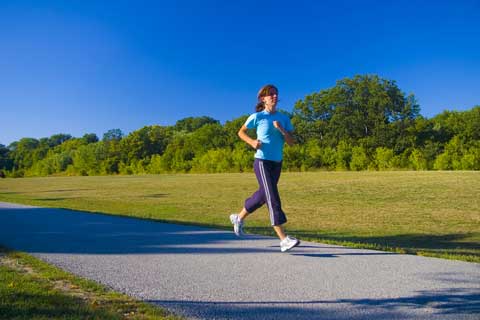Best Fitness Routines Fit Your Personality, Studies Show

Get the world’s most fascinating discoveries delivered straight to your inbox.
You are now subscribed
Your newsletter sign-up was successful
Want to add more newsletters?

Delivered Daily
Daily Newsletter
Sign up for the latest discoveries, groundbreaking research and fascinating breakthroughs that impact you and the wider world direct to your inbox.

Once a week
Life's Little Mysteries
Feed your curiosity with an exclusive mystery every week, solved with science and delivered direct to your inbox before it's seen anywhere else.

Once a week
How It Works
Sign up to our free science & technology newsletter for your weekly fix of fascinating articles, quick quizzes, amazing images, and more

Delivered daily
Space.com Newsletter
Breaking space news, the latest updates on rocket launches, skywatching events and more!

Once a month
Watch This Space
Sign up to our monthly entertainment newsletter to keep up with all our coverage of the latest sci-fi and space movies, tv shows, games and books.

Once a week
Night Sky This Week
Discover this week's must-see night sky events, moon phases, and stunning astrophotos. Sign up for our skywatching newsletter and explore the universe with us!
Join the club
Get full access to premium articles, exclusive features and a growing list of member rewards.
Many of us – especially after washing down the last of the holiday sugar cookies with yet another cup of eggnog – resolve to revamp our exercise routines in the New Year.
Unfortunately, as earnest as the plans may be, the odds of following through are pretty dismal. A yearlong study of 3,000 people with New Year's resolutions found that only 12 percent reached their goals, according to research conducted in 2007 by psychologist Richard Wiseman of the University of Hertfordshire in the United Kingdom. [5 Tips for Keeping Your New Year's Resolutions]
But while many resolutions are about not doing something – avoiding sugar, alcohol and sleeping in – resolutions about exercise are more positive. They add something to your life.
And researchers speculate, any given exercise routine may be easier to stick to if it fits your personality.
The big five
Decades of psychological research have boiled down human personality to five different components: conscientiousness, extroversion, agreeableness, neuroticism and openness to experience.
While no one is arguing that an individual personality can be completely described by these traits, psychologists consider the Big Five, as they are called, to be the basic dimensions of every personality.
Get the world’s most fascinating discoveries delivered straight to your inbox.
Each trait exists on a continuum, said consultant psychologist Dr. George Sik of eras ltd in Norfolk, United Kingdom. Some people are very extroverted, while others are not at all, and most people are somewhere in the middle.
Individual personalities are composed of various amounts of the Big Five, psychologists say. And a person who is, say, very agreeable can simultaneously be considered neurotic and conscientious, making it possible to relate to several of the below descriptions.
Reliable?
Never miss a deadline? Always on-time? Tend to follow the rules – to the letter? Psychologists would likely describe you as highly conscientious.
"Conscientiousness is strongly related to taking up physical activity in general," said Martin Hagger, a research psychologist at the University of Nottingham in the United Kingdom.
Conscientious people like having a regular exercise routine and, as a result, may prefer solo activities, such as weightlifting or using a treadmill. Such activities do not require coordinating with others, or even the cooperation of the weather, giving conscientious people a sense of control that they enjoy, Hagger told LiveScience.
Conscientious people are most likely to say they exercise for health reasons and are particularly open to exercise advice from doctors, according to a 1998 study in the journal Personality and Individual Differences.
Non-committal?
Not a planner? Hate making promises? Short attention span? Less conscientious people and those who are more impulsive need to take extra measures to help them stick to a routine, such as writing down the plan in detail, especially the when and the where, Hagger said. "At lunch time, I will put on my running shoes…"
Breaking the goal into smaller bits can also help, Wiseman advised. For example, instead of saying "I will be in marathon shape by the end of the year," try "I will increase my running distance by two miles each month."
Impulsive people may also want to focus on physical activities that "give you a buzz or high," Hagger said. Sprinting, bungee jumping and contact sports can all fit the bill.
People person?
Love to party, chat with co-workers and plan your BFF's b-day celebration? Feel depleted after spending a day alone?
Exercise alone can increase energy levels but, for some people, the biggest boost comes from interacting with others.
People who score high on personality traits such as extroversion (think, outgoing) and agreeableness (cooperative) are most likely to enjoy group classes and team sports, Hagger told LiveScience. Highly agreeable people, however, may be turned off if the dynamic is too competitive or aggressive.
Other exceptions may be yoga classes and golf teams, both of which can attract more introverted people, Sik said.
Antsy?
Find it hard to relax? Prone to worry or anxiety? Do you shift moods easily? This can be all it takes for a psychologist to label you "neurotic." (It is not as bad as it sounds; just means you're rather sensitive.)
According to research, people who have high levels of this personality trait exercise to reach weight-loss goals and improve their physical appearance. They may also use exercise as a coping mechanism to release anxiety, Sik said.
Exercise has a calming effect, he said, and people who exercise regularly – neurotic or not – tend to have exhibit more emotional stability.
Unquenchable curiosity?
Always open for an adventure? Continually seeking out the next art exhibit, film festival or big new idea? Like finding opportunities to be imaginative?
Psychologists would say you exhibit "openness to experience."
People who score high on this trait in personality tests will likely be happiest exercising outdoors, especially an activity like running, cycling, or walking.
"They can vary the route and explore," Sik said.
Particularly open people are also more likely to exercise for stress relief, something that may be a product of their unconventional lifestyles, researchers suggested in the Personality and Individual Differences study.
A little of this, and that
Of course, most people are combinations of the above, Hagger said. For example, a conscientious man who is also extroverted may want to join a very competitive sports team. An agreeable woman with lots of openness to experience may be overjoyed organizing group walks in the park.
The important thing is making the commitment to exercise. "People will make New Year's resolutions, stick to them for a couple weeks and then they fall by the wayside," Hagger said, because they get busy and other distractions gain priority.
But finding the right exercise routine – something that expresses (or soothes) your personality – can make it easier to stick to.
Still, there's no need to get neurotic about it: "Most people will find their ideal exercise instinctively," Sik said.
You can follow LiveScience on Twitter @livescience.
Robin Nixon is a former staff writer for Live Science. Robin graduated from Columbia University with a BA in Neuroscience and Behavior and pursued a PhD in Neural Science from New York University before shifting gears to travel and write. She worked in Indonesia, Cambodia, Jordan, Iraq and Sudan, for companies doing development work before returning to the U.S. and taking journalism classes at Harvard. She worked as a health and science journalist covering breakthroughs in neuroscience, medicine, and psychology for the lay public, and is the author of "Allergy-Free Kids; The Science-based Approach To Preventing Food Allergies," (Harper Collins, 2017). She will attend the Yale Writer’s Workshop in summer 2023.
 Live Science Plus
Live Science Plus











